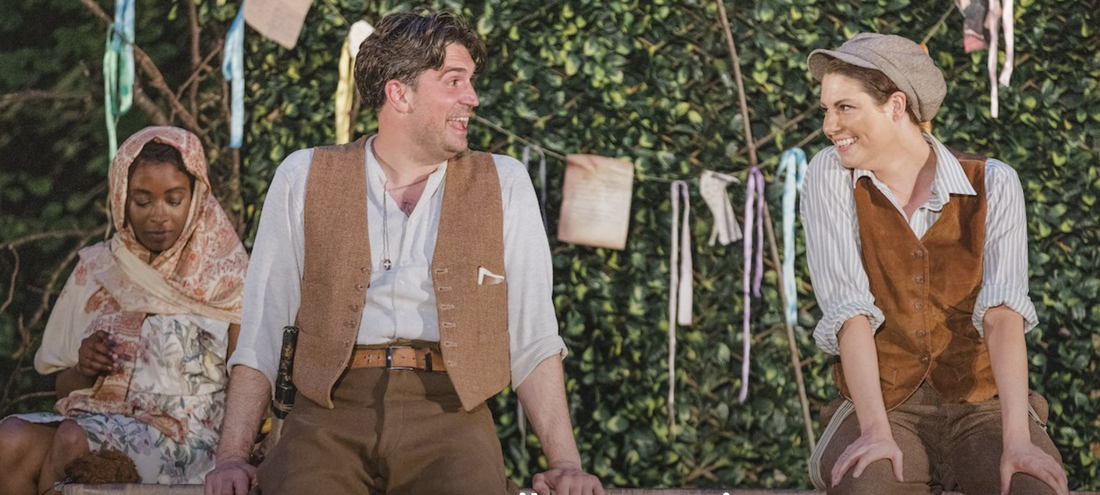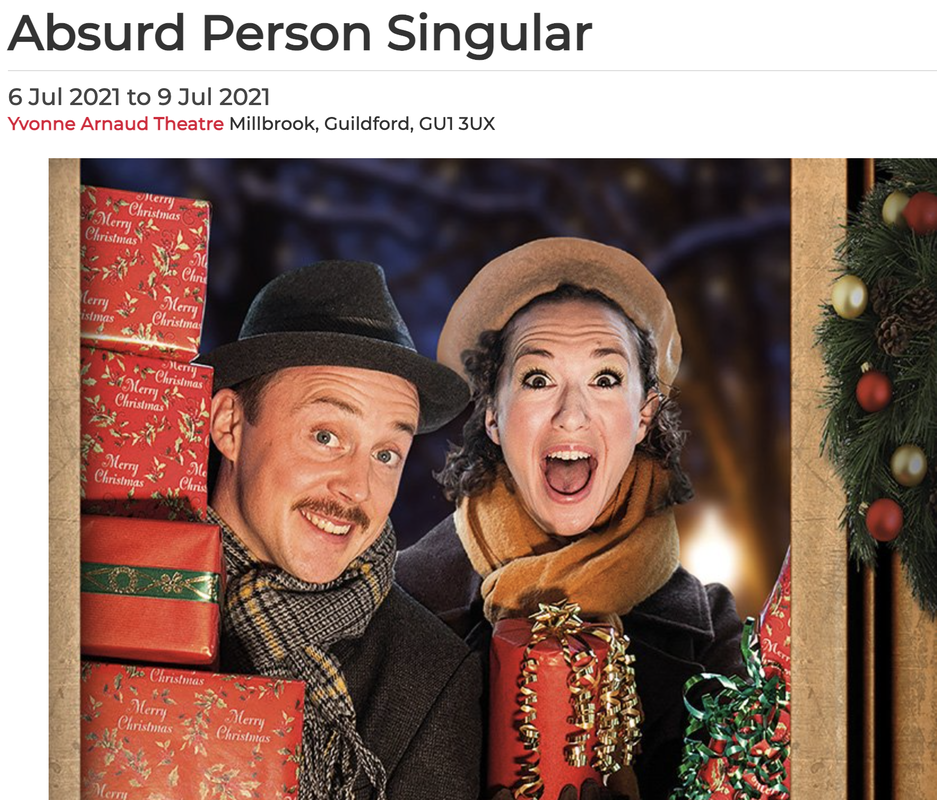|
As You Like It’ by William Shakespeare
Guildford Shakespeare Company Racks Close. Guildford, 19th – 31st July 2021 What a pleasure to sit in a lush clearing in Rack’s Close woods as the sun goes down, the lights go up on actors’ expressive faces, and Shakespeare’s timeless comedy of love at first sight plays out under towering trees. The Guildford Shakespeare Company has struck gold with their ‘As You Like it’ this week. Some of Shakespeare’s most memorable speeches shine like jewels in this plot of warring brothers and a cross-dressing maiden, spiced with glorious comic business by all of the cast. The eight members of the company between them play fifteen characters, and with brilliant direction they carry all of them off con brio. Given that the plot involves peremptory exile by the absolute authority of a ruler, the setting of this production in the authoritarian state of Germany in the 1930’s makes sense. Matt Pinches is very much at home as Touchstone, a Weimar cabaret clown for most of the play, scoring points, flouncing, teasing and occasionally sulking hilariously, in black tights, tinsel mini-skirt and red high-heels. As Jaques, the philosopher in the forest community, Sarah Gobran’s moving delivery of the famous speech known as ‘The Seven Ages of Man’ holds us spellbound. She’s terrifying as the cruel Duke in the first act, and comically charming as Phoebe, a shepherdess who falls in love with Rosalind thinking she’s a boy. Tom Richardson, as Phoebe’s rejected swain Silvius, is lovably gullible, and Corey Montague-Sholay as the other bucolic lover, Audrey, brings out all the comic potential of his rustic overalls when he’s teased by Touchstone. Rachel Summers and Natasha Rickman bring giggly girlishness to the roles of the two best friends, Celia the Duke’s daughter and her cousin Rosalind, who run away together to the forest after the Duke throws Rosalind out. Comparing notes about boys, they fill the woods with their enthusiastic screams, see-saw moods and lively scamperings. Natasha Rickman with Rosalind’s passionate, barely held-back longing creates a steamy connection to James Sheldon’s confused Orlando who believes she’s a boy. Her comic timing is faultless. Robert Maskell’s accomplished performances as the banished Duke Senior and separately as Corin, the shepherd who tries his wit against Touchstone, are very engaging: he brings both joyfully to life. Memorable moments include the scene when Rosalind, still disguised as a boy, tells all the tangled would-be lovers that they will be married tomorrow but she herself ’will marry no woman’ — the choreography of this scene is irresistibly funny. Don’t miss this wonderful chance to enjoy live theatre in a beautiful glade — The Guildford Shakespeare Company have again filled warm summer evenings with laughter and magical art. Tickets and information about the cast are here. This review was first published by Essential Surrey online magazine https://www.essentialsurrey.co.uk
0 Comments
Comedy with bite, farce with an edge, a great night out after so long away from live theatre.
Only Alan Ayckbourn can make me writhe with embarrassed laughter — and recognition — with each turn of phrase and plot. ‘Absurd Person Singular’, written in 1972, presents us with three consecutive Christmas Eves and three of the couples from whose social pretentions, misogyny and sheer mutual incomprehension Ayckbourn has so often derived farce and ironic tragi-comedy. Christmas Eve — the kitchen of Jane and Sidney Hopcraft (Felicity Houlbrooke and Paul Sandys) is the control room of Sidney’s strategic cocktail party, which should set him on the path to financial success, from the low base of his small corner shop. He is the commander and Jane the cringing subordinate responsible for all practical arrangements. ‘Don’t let me down, Jane’ is his bullying refrain. Jane struggles farcically to cope with the pressures of ‘keeping up appearances’ while entertaining social ‘betters’ on whom their ambitions depend. Timid, humiliated and scorned, she develops in the final act to become, literally, a gleeful echo of her husband. Paul Sandys as Sidney brings out all the nastiness and amorality of the character whom we will experience with amused horror in the last act. In the Hopcrafts’ kitchen we meet Eva and Geoffrey Jackson, clearly not in control of their lives. Geoffrey is amoral and ambitious, played with flexible ease by John Dorney. Eva (Helen Keely) is broken by Geoffrey’s womanising and, as we later see, desperate for affection from her selfish, facile, drunken husband. By the third act we understand that she is now the stronger of the two. In between, her breakdown is played for laughs — she sits traumatised trying to compose suicide notes while the other couples acknowledge her only with conventional noises, talking and pursuing their own lines of thought and action in parallel with each other, everyone disconnected. Great ensemble acting as a kind of temporary teamwork is orchestrated by the ostensibly weak Hopcrafts. By Act 3 we’re starting to understand the plight of Ronald Brewster-Wright and his wife Marian (Roseanna Miles). He’s ably played by Graham O’Mara as the least obnoxious of the play’s characters, mystified and confused by his relationships with women. Marian, a patronising snob, becomes a helpless drunk; I found myself worrying for her as the Hopcrafts become winners and avengers, calling the tune in the social game Ayckbourn sets up for his characters. This is comedy with an edge. Despite the many moments of sheer farce, if we didn’t laugh so much we might cry for the characters in this parable. Comedy with bite, farce with an edge, a great night out after so long away from live theatre.
Only Alan Ayckbourn can make me writhe with embarrassed laughter — and recognition — with each turn of phrase and plot. ‘Absurd Person Singular’, written in 1972, presents us with three consecutive Christmas Eves and three of the couples from whose social pretentions, misogyny and sheer mutual incomprehension Ayckbourn has so often derived farce and ironic tragi-comedy. Christmas Eve — the kitchen of Jane and Sidney Hopcraft (Felicity Houlbrooke and Paul Sandys) is the control room of Sidney’s strategic cocktail party, which should set him on the path to financial success, from the low base of his small corner shop. He is the commander and Jane the cringing subordinate responsible for all practical arrangements. ‘Don’t let me down, Jane’ is his bullying refrain. Jane struggles farcically to cope with the pressures of ‘keeping up appearances’ while entertaining social ‘betters’ on whom their ambitions depend. Timid, humiliated and scorned, she develops in the final act to become, literally, a gleeful echo of her husband. Paul Sandys as Sidney brings out all the nastiness and amorality of the character whom we will experience with amused horror in the last act. In the Hopcrafts’ kitchen we meet Eva and Geoffrey Jackson, clearly not in control of their lives. Geoffrey is amoral and ambitious, played with flexible ease by John Dorney. Eva (Helen Keely) is broken by Geoffrey’s womanising and, as we later see, desperate for affection from her selfish, facile, drunken husband. By the third act we understand that she is now the stronger of the two. In between, her breakdown is played for laughs — she sits traumatised trying to compose suicide notes while the other couples acknowledge her only with conventional noises, talking and pursuing their own lines of thought and action in parallel with each other, everyone disconnected. Great ensemble acting as a kind of temporary teamwork is orchestrated by the ostensibly weak Hopcrafts. By Act 3 we’re starting to understand the plight of Ronald Brewster-Wright and his wife Marian (Roseanna Miles). He’s ably played by Graham O’Mara as the least obnoxious of the play’s characters, mystified and confused by his relationships with women. Marian, a patronising snob, becomes a helpless drunk; I found myself worrying for her as the Hopcrafts become winners and avengers, calling the tune in the social game Ayckbourn sets up for his characters. This is comedy with an edge. Despite the many moments of sheer farce, if we didn’t laugh so much we might cry for the characters in this social parable. |
Archives
March 2024
Categories
All
|


 RSS Feed
RSS Feed